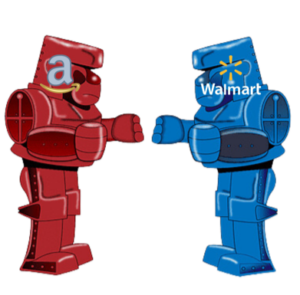Douglas Montgomery, Senior Analyst | June 7, 2023
As we enter the summer of 2023, experiments in retail-tainment (i.e., the merging of retail shopping with digital entertainment) show no signs of abating.
A Rock ‘Em Sock ‘Em Battle for the Future of Retail
The two US companies with the most revenue in 2022 are, according to Fortune, Amazon and Walmart. Both are also at the forefront of immersive shopping, itself a type of retail-tainment. To date, however, their efforts appear to be generating different results.
Amazon Anywhere—built by Niantic of Pokémon Go fame and Harry Potter Wizarding Worlds shame—creates a “path to purchase” for video gamers and app users to discover and buy products from Amazon without having to leave the game or app. The platform’s first move into the blurry world of immersive retail-tainment is Peridot, which combines e-commerce, augmented reality (A/R), and the concept of virtual pets, like the OG, Tamagotchi.
For its part, Walmart launched Walmart Land, a Web3 space for “interactive entertainment for customers” within Roblox, a virtual world/early metaverse with 52 million members, mostly Gen Zs to which Walmart wanted access. Simultaneously, the Universe of Play opened its doors, which the company positioned as the ultimate virtual toy destination. More than half of Roblox users are under the age of 13, though the 18-24 segment is growing fast. In theory, Walmart Land would bring the best of fashion, style, beauty, and entertainment products to its community. As Forbes’ senior contributor Paul Tassi noted when Walmart Land launched in September 2022, it looked like “a giant amusement park where the Walmart logo looms large in the background like a digital Eye of Sauron.” His review at the time was anything but positive, and he was spot on. Walmart shuttered Universe of Play only six months after launching, though a wounded Walmart Land is still operating within Roblox.
Retailers and brands feel pressure from investors to not ignore emerging platforms and start addressing younger adult buyers. Unfortunately, this led to rather clumsy attempts to embrace unproven new technologies (i.e., the metaverse). No surprise, then, unfavorable reviews and threats from TINA.org about privacy, along with a poor engagement, ended the Universe of Play experiment.
Battling for the Next Generation of Shoppers
The reason so many companies are interested in social shopping is to access older Gen Zs, 18-26 years of age. As digital natives, they are notably different from prior generations, and their needs and expectations are a key focus of retail marketers looking to instill buying habits that last for decades.
Gen Zs spend far less time watching traditional TV than their adult counterparts (under one hour per day) and more time on social media, through which they are quite comfortable buying products and services. Nine-in-ten are gamers, especially mobile. Gaming is a top entertainment activity for Gen Zs who, according to 2022 Deloitte research, rely on it for socializing and self-expression.
The Blurring of Retail & Entertainment to Continue
Retailers best heed the advantage they have with shoppable/immersive television, as brands are also experimenting with the platform. The opportunity to go direct to consumer remains very attractive. Ikea, for example, has its own “Escape room” on Snapchat. As the entertainment value of such brand experiments increases, so does their potential to pull sales away from traditional retail. In a 2017 Bloomberg interview, Tim Cook admitted Apple had been talking to IKEA about 3D imaging. Rumors suggest Apple working on an A/R feature for its own Apple Store, therefore joining Amazon and Walmart into this space. Undoubtedly, the company’s new Vision Pro will be part of this experience.
Click Friction
Given much of retail survives just fine without being gamified or juiced with entertainment, a compelling option for Amazon/Walmart/Apple, or any other retailer, is to simply to make online shopping and buying easier.
Amazon pioneered the concept of one-click shopping and, as a member of the $1T market cap club, is doing just fine. Those who live in the retail space may be better off using new technologies to make the shopping experience easier, less so “fun.”

